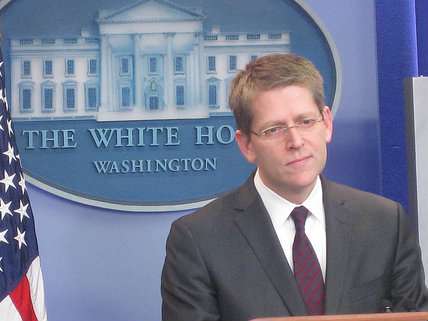Obamacare Questions the White House Won't Answer
The administration has evaded questions about the health law instead of answering them.

In a briefing this week, White House Press Secretary Jay Carney applauded the administration's openness regarding data related to Obamacare performance and implementation. "If you look at how we've dealt with data as it's become available over the past several months, both good data and bad data, we've done our best to provide it to you when we are confident about the accuracy of it," he said.
Every White House toots its own horn, but this was a bit much. The Obama administration's signature domestic policy achievement has been marked by an unwillingness to directly answer basic questions about the law and its implementation. When it comes to Obamacare, the most transparent administration in history is anything but.
Months after the launch of the exchanges, key questions about the law remain unanswered. First among those is how many people have actually enrolled. Not merely signed up, but enrolled, by picking a plan, requesting a bill, and paying the first month's premium.
The administration claims that more than 2.1 million individuals have signed up for private health plans thanks to the law, but has provided no data on how many of those people have actually paid the first month's premium.
Collecting and accounting for initial premiums was one of the most difficult parts of implementing Obamacare's state-based predecessor, RomneyCare, in Massachusetts, according to a Washington Post op-ed by Jon Kingsdale, the founding administrator of the Bay State's exchange. And the administration's actions so far haven't exactly suggested that it's having a lot of success either. Last month federal officials encouraged insurers to accept payment for insurance after coverage began. Insurers complied, saying that they would count individuals as enrolled in January if they paid by the 10th of the month. There's no word on how many have paid so far, but at the end of December, insurance industry sources told The Wall Street Journal that only about half of new enrollees had actually sent in a check.
Nor do we know how many people have enrolled in Medicaid thanks to Obamacare. The administration reports some four million sign-ups between October and November, but that figure includes people who were already eligible and got coverage for the first time as well as Medicaid beneficiaries who were renewing their existing enrollments, including those residing in states that did not participate in Obamacare's Medicaid expansion. An estimate by Sean Trende of RealClearPolitics suggests that the number of enrollees whose coverage was only possible through Obamacare could be an order of magnitude smaller—perhaps less than 380,000.
The administration isn't just obscuring the total number of enrollments in the law. It's also declining to provide information about the demographic mix of the enrollees. (Carney's self-congratulatory remarks came in the context of refusing to provide that data.) That's especially telling given that, as Obamacare enrollment numbers have sagged below pre-launch administration estimates, the White House's emphasis has shifted its early definition of success for the law from total sign ups to achieving the right balance of young and healthy beneficiaries. There are hints of future trouble here, as well: Kentucky, which since launch day has had one of the best-functioning exchanges in the nation, appears to have a demographic mix that is heavily skewed toward the old.
These unanswered questions are a continuation of a longstanding pattern by the administration of obfuscation and outright refusal to answer legitimate questions about Obamacare. Over the past year and a half, Republicans in Congress have made multiple requests for information about the law and how it is being run, only to receive silence and tardy non-answers in return.
In May of 2012, a group of GOP lawmakers sent a letter to Medicare director Marilyn Tavenner about $2 billion in taxpayer financed loans made to co-op health plans through the law. Medicare officials didn't respond until nine months later, and then provided little useful information. By the end of October 2013, it became clear that the GOP's concerns were not frivolous: One of the co-ops had shut down, and nine others showed signs of financial distress, leaving taxpayers potentially on the hook for more than $1 billion in outstanding loans, according to a government audit. A follow-up letter about the program sent to Health and Human Services Secretary Kathleen Sebelius in November 2013 has yet to generate any response.
In August of last year, 39 GOP Senators asked the White House for details about federal agencies promoting the law, citing administration spreadsheets showing that 21 agencies were participating in the implementation and promotion of Obamacare—none of which had any responsibilities under the law. Under what legal authority were these agencies working on the law? Where was their funding activities related to the health law coming from? The administration didn't answer.
Nor has the administration responded to questions asked by four Republican Senators about paying contractors tasked with fixing the exchanges that crashed and burned last year.
Republican staffers on the Hill tell that the administration is similarly unwilling to answer questions behind closed doors. In a summer meeting in which the Treasury Department was supposed to provide GOP aides with details about the administration's decision to delay the employer mandate, Treasury officials simply stalled, giving lengthy, rambling answers with little useful information and no follow-ups.
In public and in private, this has been the administration's response to questions about the health law: to stall, delay, ignore, and obscure. That's even true when asked about the questions it's not answering: Contrary to Jay Carney's defensive insistence that the administration has prioritized openness about the health law, the executive has done its best to evade questions rather than answer them.


Show Comments (70)